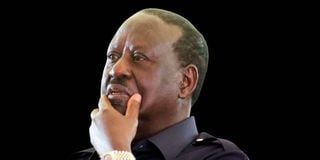
ODM leader Raila Odinga.
There may be no women contesting for the upcoming AU Commission Chairperson’s elections. But candidates will need to rely on their perfect pairing with women to cross that bridge in February next year.
This week, the African Union announced four names of candidates competing for the Chairperson’s seat. They include Kenya's former Prime Minister and opposition leader Raila Odinga, former Mauritius Foreign Minister Anil Kumarsingh Gayan, Djibouti Foreign Minister Mahmoud Ali Youssouf and Richard James Randriamandrato, a former Foreign Minister of Madagascar.
These candidates are all from the eastern region, the only eligible part of Africa allowed to enter the race for chairperson of the African Union Commission. Under the rotational rules passed by the AU, the seats in the Commission, from Chairperson, deputy and six commissioners will have to be rotational in the English alphabetical order. The outgoing Chairperson, Moussa Faki Mahamat is from Chad, which is in the Central region.
Read: Raila's call on dollar dominance: Azimio leader backs a Pan-African Payment and Settlement system
As it is, the deputy will have to come from the north, replacing Rwanda’s Monique Nsanzabaganwa, whose region falls in eastern region. The AU has categorized countries to fall in these regions without necessarily following the pattern of their regional economic blocs. For example, Madagascar and Mauritius which often run affairs in SADC region are still in eastern region.
That means the contender for the Chairperson’s seat must not only look out for a deputy of the opposite gender, but also assess if the pairing can ruin other votes.
The deputy’s race promises a tasty race between Algeria and Morocco, the two north African countries that have often battled for influence in sub-Saharan Africa. Algeria has fronted Salah Francis Elhamdi, a diplomat who has served as Permanent Representative to the AU, and later UN as well as Selma Malika Haddadi, who was ambassador to Kenya until March this year. Algiers fronted Ms Haddadi’s name earlier on July 30 but added Elhamdi’s on the deadline day on August 6.
Elhamdi may have to drop out of the race as he will be ineligible to be a deputy in a race where the chairperson is certainly male. AU’s gender rotation rules forbid the chair and deputy being of the same gender but the rules do not openly bar regions from fronting candidates of either gender.
If the race is left for female contenders only, it means Morocco’s Latifa Akharbach, current head of the country’s High Authority of Audiovisual Communication (HACA), will compete against Ms Haddadi. That could test not just the two countries' influence across the continent, but also pose a dilemma for those fronting chairperson candidates. In the past, Morocco was influential in backing Mr Faki, who had emerged from a low-key candidacy to defeat front runners including Amina Mohamed of Kenya in 2017.
Both Algeria and Morocco have recently been engaging in support-seeking on the continent, using tools such as fertilizer donations and cultural relations to build support. Their rivalry has a history. Back in 1982, Algeria backed the admission of the Sahrawi Arad Democratic Republic (SADR) into the then Organisation of African Unity, the precursor of the African Union.
The Summit that admitted SADR was incidentally held in Kenya and it forced Morocco to quit OAU in protest. Morocco did return to the AU in 2017 but it still contests the membership of SADR in the AU, arguing the Sahrawi region is a part of Morocco. The government that runs SADR is incidentally in a refugee camp inside Algeria.
The Moroccan-Algerian rivalry, however, is not exclusive and could even be spoilt by Egypt and Libya, both of who have fronted candidates.
Cairo nominated Dr Hanan Morsy. She is the current Deputy Executive Secretary and Chief Economist of the United Nations Economic Commission for Africa, based in Addis Ababa. Cairo also nominated, on the deadline day, Mohamed Ahmed Fathi Edrees, an Egyptian diplomat who has served as permanent representative both at the AU and the UN. He may drop out of the race. But Dr Morsy will also have to face Najat Hajjaj. She is a Libyan diplomat who courted controversy in the Gaddafi days after rights watchdogs accused her of shielding the then-Libyan leader from investigations.
The Panel of Experts for vetting will assess the qualifications of each entrant and will interview them before formally endorsing their bids ahead of elections. The Panel includes Burundian academic Paul Ngarambe, Ethiopian diplomat Konjit SineGiorgis, Patrick Hayford of Ghana and South Africa's Nozipho Joyce Mxakato-Diseko.
After the panel vets and endorses the candidates, those for the chairperson’s position will then have to attend a public televised debate to discuss their visions. Eligible African Union member states will then vote for their preferred choice in February in a secret ballot by the Assembly of Heads of State and Government. The deputy’s position is often voted for by the Executive Council, the grouping of foreign ministers and their decision is ratified by the Assembly.
The outright winner must get at least 2 thirds of the voting members of the Assembly of heads of state and government. If not, several rounds can be taken in which the winner can get a simple majority to be declared the new chairperson.








